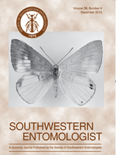
SOUTHWESTERN ENTOMOLOGIST
Scope & Guideline
Unveiling Insights for Sustainable Agricultural Practices
Introduction
Aims and Scopes
- Entomological Research:
The journal emphasizes research in various aspects of entomology, including taxonomy, systematics, and biodiversity of insect species, particularly those that are native or invasive in the southwestern region. - Pest Management Strategies:
Research articles often focus on integrated pest management approaches, evaluating the efficacy of various insecticides, biological control agents, and alternative pest management strategies. - Ecological Interactions:
The journal publishes studies exploring the ecological relationships between insects and their environment, including plant-insect interactions, predator-prey dynamics, and the impact of climate on insect populations. - Molecular and Genetic Studies:
There is a focus on molecular biology and genetics in entomology, including studies on genetic diversity, molecular identification of species, and the implications of genetic research for pest management. - Applied Entomology:
Research that applies entomological knowledge to solve real-world problems, such as agricultural pest control, is a core focus, highlighting the relevance of entomology in agriculture and public health.
Trending and Emerging
- Climate Change Impact on Insects:
There is a growing interest in understanding how climate change affects insect populations, their distribution, and their interactions with ecosystems, indicating a response to global environmental changes. - Biodiversity and Conservation:
Research focusing on the conservation of insect biodiversity, particularly in relation to habitat loss and invasive species, is becoming increasingly prominent, reflecting broader ecological concerns. - Biological Control and Eco-Friendly Approaches:
There is a trend towards the exploration of biological control agents and environmentally sustainable pest management strategies, as researchers seek alternatives to conventional chemical pesticides. - Molecular Techniques in Entomology:
The use of molecular techniques for species identification, population genetics, and understanding pathogen interactions is on the rise, reflecting advancements in technology and methodologies. - Insect-Plant Interactions and Agricultural Impacts:
Research examining the interactions between insects and plants, particularly in agricultural settings, is gaining attention as it provides insights into pest management and crop health.
Declining or Waning
- Historical Taxonomy:
Research focused on historical taxonomy and historical records of insect species has decreased, possibly as a result of a greater emphasis on ecological and applied research. - Traditional Chemical Control Methods:
The publication of studies primarily centered on traditional chemical insecticides is waning, as the focus shifts towards integrated pest management and environmentally friendly alternatives. - General Insect Behavior Studies:
While insect behavior remains a relevant topic, studies that do not connect behavioral research to ecological or management outcomes are appearing less frequently, indicating a trend towards more application-oriented research.
Similar Journals
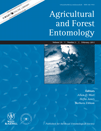
AGRICULTURAL AND FOREST ENTOMOLOGY
Exploring the vital role of insects in sustainable ecosystems.AGRICULTURAL AND FOREST ENTOMOLOGY is a leading journal published by Wiley, focusing on the interface of entomology, agriculture, and forestry. With a robust impact reflected in its Q2 and Q1 quartile rankings in prominent categories like Agronomy and Crop Science, Forestry, and Insect Science, this journal serves as a vital platform for researchers and professionals seeking to advance their understanding of insect impacts on agricultural and forest ecosystems. Since its inception in 1999, it has provided a comprehensive collection of high-quality research, facilitating interdisciplinary discussions and innovations in pest management, biodiversity, and sustainable practices. Although it does not currently offer Open Access, the journal continues to uphold rigorous peer-review standards, ensuring that published works maintain a profound scientific value. As of 2023, its Scopus rankings further signify its prominence in the field, engaging a global audience keen on addressing the pressing challenges faced within agricultural and forest sciences.
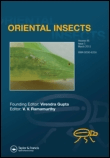
ORIENTAL INSECTS
Connecting Researchers to Insect BiodiversityORIENTAL INSECTS is a distinguished journal dedicated to advancing the field of Insect Science, published by the reputable Taylor & Francis Ltd. With its long-standing history since 1967, this journal provides a platform for innovative research focused specifically on the diverse insect fauna of the Oriental region, encompassing topics such as taxonomy, ecology, physiology, and behavior. The journal is indexed with an ISSN of 0030-5316 and an E-ISSN of 2157-8745, making it easily accessible to a global audience. Although it currently does not operate under an Open Access model, its rigorous peer-review process ensures the dissemination of high-quality research. As a Q4 journal in the Insect Science category for 2023 and ranked 103 out of 181 in Scopus, ORIENTAL INSECTS remains a vital resource for researchers, professionals, and students seeking to enhance their understanding of insect biodiversity and conservation. Located in the United Kingdom, it is committed to promoting the latest scientific findings and fostering collaboration among entomologists worldwide, contributing significantly to the academic community.
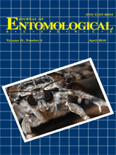
JOURNAL OF ENTOMOLOGICAL SCIENCE
Pioneering Insights in Insect Science and EcologyJOURNAL OF ENTOMOLOGICAL SCIENCE, published by the Georgia Entomological Society Inc, is a crucial resource in the field of insect science and ecology. With a rich history since its inception in 1993, the journal provides a platform for innovative research and comprehensive reviews addressing various aspects of entomology. Although not an open-access journal, it is highly regarded within its community, holding a Q3 ranking in Agronomy and Crop Science, Ecology, Evolution, Behavior and Systematics, and Insect Science as of 2023. Each issue promises to contribute valuable insights to professionals, researchers, and students alike, making it an essential publication for those looking to stay abreast of developments in entomological studies. The journal's editorial commitment ensures that it remains at the forefront of entomological research through rigorous peer reviews and a dedication to scholarly excellence.
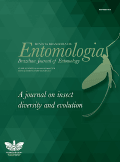
REVISTA BRASILEIRA DE ENTOMOLOGIA
Advancing insect science through Brazilian biodiversity.REVISTA BRASILEIRA DE ENTOMOLOGIA, published by the SOCIEDADE BRASILEIRA DE ENTOMOLOGIA, is a premier open-access journal dedicated to the field of insect science, particularly within the context of Brazil's rich biodiversity. Since its inception in 2002, this journal has aimed to provide a platform for the dissemination of high-quality research, covering various aspects of entomology including behavior, ecology, and the impact of insects on agriculture. With an ISSN of 0085-5626 and an E-ISSN of 1806-9665, it is indexed in Scopus, ranking in the 39th percentile among its peers in the insect science category. Operating out of Curitiba, Brazil, and with emerging recognition beyond national borders, the journal reflects an ongoing commitment to advancing the science of entomology through rigorous peer-reviewed articles. By making its content freely accessible, REVISTA BRASILEIRA DE ENTOMOLOGIA encourages widespread engagement and collaboration among researchers, professionals, and students alike.

BULLETIN OF INSECTOLOGY
Fostering Collaboration for Environmental SolutionsBULLETIN OF INSECTOLOGY is a prominent academic journal published by ALMA MATER STUDIORUM, UNIV BOLOGNA, Italy, specializing in the field of Insect Science. The journal, with ISSN 1721-8861 and E-ISSN 2283-0332, has established itself as a vital resource for researchers and professionals interested in the diverse aspects of entomology and its applications. It ranks in the Q2 category for Insect Science as of 2023, placing it among the top journals in its field with a Scopus rank of 79 out of 181. The BULLETIN OF INSECTOLOGY is committed to disseminating high-quality research and innovative studies, facilitating open dialogue and collaboration among scientists. As an essential platform for sharing groundbreaking findings, it contributes significantly to the body of knowledge in agricultural and biological sciences, making it an invaluable asset for scholars and practitioners alike. With coverage from 2002 to 2024, this journal continues to foster advancements in entomological research and its importance in tackling environmental challenges.
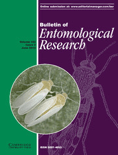
BULLETIN OF ENTOMOLOGICAL RESEARCH
Illuminating the Role of Insects in Ecological and Medical ContextsBULLETIN OF ENTOMOLOGICAL RESEARCH, published by Cambridge University Press, is a prestigious journal that has been at the forefront of entomological research since its inception in 1910. With an impressive track record extending through to 2024, this journal serves as a vital platform for advancing knowledge in various related fields, notably Agronomy and Crop Science and Insect Science, where it ranks in the top quartile (Q2) and maintains a commendable position within the Scopus rankings in its categories. Notably, its contributions also intersect with Medicine in a broader scope, fostering interdisciplinary insights. While access to the journal content is not classified as 'Open Access,' its rigorous peer-reviewed articles are crucial for researchers, professionals, and students seeking to enhance their understanding of entomology and its applications in agronomy and beyond. The journal's impact is reflected in its notable percentile rankings, emphasizing its relevance and influence in the academic community. Located at the heart of the UK, the BULLETIN OF ENTOMOLOGICAL RESEARCH continues to be an essential resource for those dedicated to the study and understanding of insects and their impacts on agriculture and health.

REVISTA DE LA SOCIEDAD ENTOMOLOGICA ARGENTINA
Unveiling the Secrets of Insect Behavior and EcologyREVISTA DE LA SOCIEDAD ENTOMOLOGICA ARGENTINA is an esteemed open-access journal dedicated to the field of entomology, published by the SOCIEDAD ENTOMOLOGICA ARGENTINA. Since its transition to open access in 2013, the journal has sought to promote research in insect science, ecology, and related disciplines, facilitating global dissemination of knowledge and encouraging collaborative studies across borders. Located in the vibrant scientific landscape of La Plata, Argentina, the journal is indexed in Scopus and categorized in the fourth quartile of ecology and insect science, reflecting its commitment to enhancing the discourse within these critical fields. Aiming to bridge the gap between researchers, students, and professionals, REVISTA DE LA SOCIEDAD ENTOMOLOGICA ARGENTINA serves as a platform for innovative research, reviews, and reports on ecological interactions, behavior, and systematic entomology, ultimately driving forward our understanding of insect biodiversity and its broader environmental impacts.
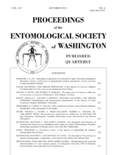
PROCEEDINGS OF THE ENTOMOLOGICAL SOCIETY OF WASHINGTON
Fostering Innovative Research in EntomologyProceedings of the Entomological Society of Washington is a distinguished journal dedicated to the field of entomology, published by the Entomological Society of Washington. With a rich history dating back to 1981 and a commitment to fostering scientific discourse, this journal serves as a vital platform for researchers and professionals specializing in insect science and ecology. It holds a respectable<> impact factor and is categorized in the Q3 quartile in both Ecology, Evolution, Behavior and Systematics and Insect Science, indicating its relevance within the scientific community. Although it does not offer open access, it provides a curated selection of high-quality research articles that significantly contribute to the understanding of insect biology, behavior, and taxonomy. The journal aims to bridge gaps in current research and inspire innovations in entomological studies, making it an essential resource for students, researchers, and practitioners in the field.

CANADIAN ENTOMOLOGIST
Unraveling the Mysteries of the Insect WorldCanadian Entomologist, published by Cambridge University Press, is a prominent journal dedicated to the field of entomology, covering key areas such as insect science, ecology, and evolutionary biology. With its origins dating back to 1868, this esteemed journal has continuously contributed to the understanding of insect behavior, systematics, and physiology, engaging researchers and professionals alike. Although currently not an Open Access journal, it offers valuable insights through its rigorously peer-reviewed articles, reflecting its commitment to scientific excellence. The journal has garnered a respectable Q3 ranking in various categories, including Ecology, Evolution, Behavior, and Systematics, making it a critical resource for scholars and students who seek to explore the complex interactions within insect populations and their environments. Researchers can trust Canadian Entomologist to provide relevant and impactful research that shapes contemporary understanding in the realm of entomological studies, fostering the growth of this vital scientific discipline.
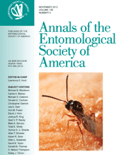
ANNALS OF THE ENTOMOLOGICAL SOCIETY OF AMERICA
Innovating Insights into the World of InsectsANNALS OF THE ENTOMOLOGICAL SOCIETY OF AMERICA is a premier journal dedicated to advancing the field of insect science, published by Oxford University Press. With an impressive impact factor and classified in the Q1 quartile for its category, this journal ranks among the top publications in agricultural and biological sciences, specifically within insect science, positioned at #28 out of 181, indicating its significant influence and high-quality research contributions. The journal aims to disseminate original research, comprehensive reviews, and groundbreaking findings that enhance our understanding of entomology, spanning across ecological, evolutionary, and applied segments. With a consistent publication history since 1938, researchers, professionals, and students will benefit from the wealth of knowledge presented in its pages. Although the journal does not currently offer open access, it remains a vital resource for those seeking to stay at the forefront of entomological research and innovation.